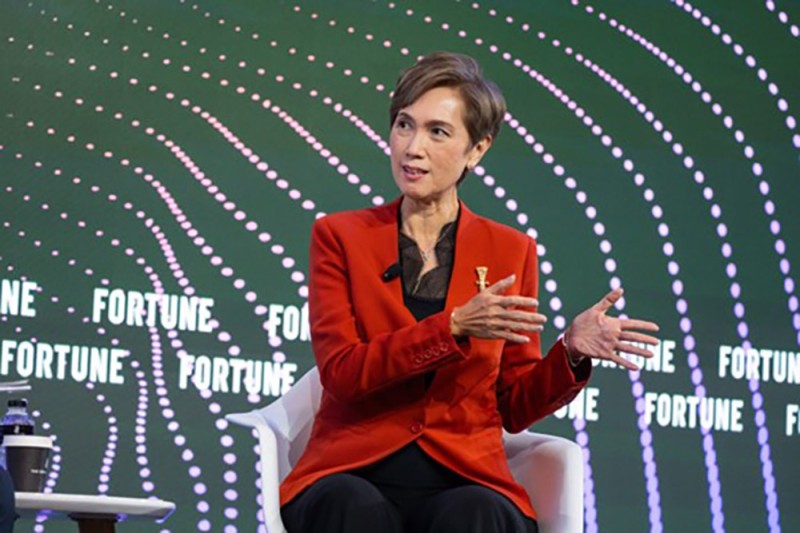
新加坡数码发展及新闻部部长杨莉明表示,新加坡欢迎DeepSeek之类成本更低廉的模型,因为小国和小企业同样想使用人工智能,但不希望支付高昂费用。
周二杨莉明在新加坡举行的《财富》人工智能头脑风暴大会上指出,企业在考虑应用人工智能时,不可避免地要权衡成本。
“从降低成本的视角看,类似DeepSeek的创新非常受欢迎,”她说。
今年早些时候,中国人工智能初创公司DeepSeek推出的大模型曾引发美国金融市场万亿美元规模的抛售。DeepSeek证明,哪怕用于训练的资源远少于行业主流,也能训练出与顶尖模型性能比肩的人工智能。投资者重新考虑科技巨头为“人工智能军备竞赛”砸下的巨额资本支出是否值得,科技股应声暴跌。如今美国科技巨头已从DeepSeek引发的抛售潮中恢复,但报道称微软和亚马逊等巨头仍在评估数据中心方面的支出。
与此同时,投资者争相押注全球第二大经济体的人工智能技术发展,DeepSeek带动中国科技股飙升。
杨莉明澄清,新加坡在本国人工智能发展计划中并未选择DeepSeek,但她指出,这一模型说明人工智能技术正顺应更广泛的转变,开始关注西方以外地区的需求。
“大语言模型主要基于西方语料库,尤其是以英语训练的模型,在东南亚语境下会水土不服,”她解释说。
如果人工智能仅用英语训练,而没有覆盖东南亚数百种语言,“可能无法满足新加坡及周边国家的需求。”
新加坡正牵头推进“东南亚语言一体化网络”(SEA-LION)项目,这是一系列开源大语言模型,训练时会用越南语、马来语等地区语言。
美国、中国……与新加坡
新加坡官方一直在美国和中国之间“走中间路线”,公开表示不愿与任何一方结盟。新加坡是美国的安全伙伴,又与中国保持密切的文化与经济联系。
“新加坡一贯的做法是:以符合自身利益的方式行事,”杨莉明说,“我们当然希望两个大国的关系能大幅回暖,但这并非一厢情愿就能实现。”
杨莉明表示,在人工智能领域新加坡既向美国学习,也向中国取经。例如,她提到人工智能治理方面,可以与美国展开合作。
而中国则提供了丰富的人工智能应用案例。“我们注意到,中国的产业基础广阔且深厚,人工智能应用场景非常值得观察和学习。”
新加坡也计划在国内加强人工智能实力。周二杨莉明透露,新加坡政府计划将“人工智能从业者”群体扩大到“各行业专业人士”,包括律师、医生、会计师、制造业工人等。
“专业人士将熟练掌握人工智能工具,然后就能展示如何为所在机构创造更多价值。”(*)
译者:梁宇
审校:夏林
新加坡数码发展及新闻部部长杨莉明表示,新加坡欢迎DeepSeek之类成本更低廉的模型,因为小国和小企业同样想使用人工智能,但不希望支付高昂费用。
周二杨莉明在新加坡举行的《财富》人工智能头脑风暴大会上指出,企业在考虑应用人工智能时,不可避免地要权衡成本。
“从降低成本的视角看,类似DeepSeek的创新非常受欢迎,”她说。
今年早些时候,中国人工智能初创公司DeepSeek推出的大模型曾引发美国金融市场万亿美元规模的抛售。DeepSeek证明,哪怕用于训练的资源远少于行业主流,也能训练出与顶尖模型性能比肩的人工智能。投资者重新考虑科技巨头为“人工智能军备竞赛”砸下的巨额资本支出是否值得,科技股应声暴跌。如今美国科技巨头已从DeepSeek引发的抛售潮中恢复,但报道称微软和亚马逊等巨头仍在评估数据中心方面的支出。
与此同时,投资者争相押注全球第二大经济体的人工智能技术发展,DeepSeek带动中国科技股飙升。
杨莉明澄清,新加坡在本国人工智能发展计划中并未选择DeepSeek,但她指出,这一模型说明人工智能技术正顺应更广泛的转变,开始关注西方以外地区的需求。
“大语言模型主要基于西方语料库,尤其是以英语训练的模型,在东南亚语境下会水土不服,”她解释说。
如果人工智能仅用英语训练,而没有覆盖东南亚数百种语言,“可能无法满足新加坡及周边国家的需求。”
新加坡正牵头推进“东南亚语言一体化网络”(SEA-LION)项目,这是一系列开源大语言模型,训练时会用越南语、马来语等地区语言。
美国、中国……与新加坡
新加坡官方一直在美国和中国之间“走中间路线”,公开表示不愿与任何一方结盟。新加坡是美国的安全伙伴,又与中国保持密切的文化与经济联系。
“新加坡一贯的做法是:以符合自身利益的方式行事,”杨莉明说,“我们当然希望两个大国的关系能大幅回暖,但这并非一厢情愿就能实现。”
杨莉明表示,在人工智能领域新加坡既向美国学习,也向中国取经。例如,她提到人工智能治理方面,可以与美国展开合作。
而中国则提供了丰富的人工智能应用案例。“我们注意到,中国的产业基础广阔且深厚,人工智能应用场景非常值得观察和学习。”
新加坡也计划在国内加强人工智能实力。周二杨莉明透露,新加坡政府计划将“人工智能从业者”群体扩大到“各行业专业人士”,包括律师、医生、会计师、制造业工人等。
“专业人士将熟练掌握人工智能工具,然后就能展示如何为所在机构创造更多价值。”(*)
译者:梁宇
审校:夏林
Singapore will welcome cheaper models like China’s DeepSeek, says the country’s digital minister, as smaller countries and companies try to explore how to get the benefits from AI without paying exorbitant prices for the tech.
Companies considering the use of AI inevitably have to consider cost, Josephine Teo, Singapore’s minister for digital development and information, explained at the Fortune Brainstorm AI Singapore conference on Tuesday
“From the perspective of bringing down costs, innovations such as DeepSeek are very welcome,” she said.
DeepSeek’s AI models helped spark a trillion-dollar sell-off in U.S. financial markets earlier this year. The Chinese AI startup proved it was possible to create AI models that matched the performance of leading-edge models, while using significantly fewer resources for training. Tech shares plunged as investors reassessed whether massive capital spending in pursuit of the AI arms race was truly worth it. While U.S. Big Tech has recovered from the DeepSeek selloff, companies like Microsoft and Amazon are still reportedly reassessing their spending on data centers.
In turn, DeepSeek sparked a surge in Chinese tech stocks, as investors tried to buy into AI developments in the world’s second-largest economy.
Teo clarified that Singapore wasn’t using DeepSeek in its own AI development plans, but pointed out it was part of a broader shift in this new technology to reflect global needs.
“We know that large language models that are trained primarily on a Western corpus, primarily on perhaps English as the language, will have difficulties being applied in the Southeast Asian context,” she explained.
AI that’s been trained on English, and not one of Southeast Asia’s hundreds of different languages, “will perhaps not meet the requirements of Singapore as well as our neighboring countries.”
Singapore has helped to foster the Southeast Asian Languages in One Network (SEA-LION) project, a group of open-source large language models that are trained on a number of regional languages like Vietnamese and Malay.
The U.S., China … and Singapore
Singaporean officials have tried to chart a middle path between Washington and Beijing, expressing a wish to not align with either side. The Southeast Asian country is a security ally of the U.S., but also maintains close cultural and economic ties to China.
“Singapore’s consistent approach is to act in a way that meets our own interests,” Teo said. “We would certainly hope that relationships between the two giants can warm up to a much greater extent, but it’s not something that we can wish to happen, and it will happen.”
Still, Teo said Singapore can learn from both the U.S. and China when it comes to AI. For example, Teo cited AI governance as one area of cooperation with Washington.
China, on the other hand, offers examples of how AI can be used. ”We noticed that China’s industrial foundation is so broad and deep that the applications of AI could be very interesting to watch and learn from,” she said.
And Singapore, too, will also grow AI skills at home. On Tuesday, Teo described how the country plans to expand the country’s pool of “AI practitioners” to “people who are in the professions”: lawyers, doctors, accountants, and manufacturing workers.
“They [will] acquire this facility with using AI, and then they can demonstrate how they can create more value for their organizations, “ she said.

